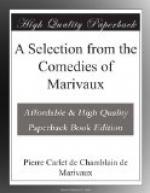[177] PENETRER = Decouvrir.
[178] AVANT QUE DE. See note 93.
[179] NEUVE, ‘Novel.’ Compare: “C’etait bien le plan le plus original, le plus beau, le plus neuf!” (Merimee, la Guzla, avertissement).
[180] IRREGULIER, ‘Unseemly,’ ‘impolite.’
[181] JUSQUE LA. See note 115.
[182] LUI FEROIT TORT. Here modern usage requires the partitive du.
[183] SUR L’ARTICLE DE, ‘Concerning,’ ‘in the matter of.’
[184] LUI. Marivaux felt the charm of this artless reply, and repeated it in l’Epreuve (see Introduction, p. lxiii), with the added epigram of Lisette: “Et quel est donc cet homme qui s’appelle lui par excellence?”
[185] GUIGNON, ‘Bad luck.’ From guigner (’to ogle,’ ’to peep’), and has some connection with the idea of the evil eye (Littre).
[186] CELA N’EST POINT CONTRAIRE A FAIRE FORTUNE. Cela n’empeche pas de faire fortune is more modern and better French.
[187] IMAGINATION. See note 44.
[188] IL LUI PREND. Il is redundant, and in some of the later editions is omitted.
[189] ACCOMMODONS-NOUS, ‘Let us compromise.’ Compare: “Le Ciel defend, de vrai, certains contentements; mais on trouve avec lui des accommodements.” (Moliere, le Tartuffe).
[190] FRIAND, ‘Eager.’ Primarily friand signified the gift of a delicate taste, and a rare appreciation of dainties. As used by Harlequin it recalls his ragoutant. Cf. note 132.
[191] HABIT DE CARACTERE. Garb which designates, which characterizes any particular profession. As used here, it signifies Harlequin’s livery as valet.
[192] GALON DE COULEUR, ‘The fact that I wear livery.’ The reference is to the braiding on the livery-coats worn by the retainers and domestics of the nobility in the seventeenth and eighteenth centuries, as well as at the present day. “Apres son deuil (the author speaks of Lauzun, who had gone into mourning for the Grande Mademoiselle), il ne voulut pas reprendre sa livree, et s’en fit une de brun presque noir, avec des galons bleus et blancs” (Saint-Simon, Memoires, I).
[193] BUFFET, Side-table, on which are placed the dishes destined for table service, and on which they may be left after clearing the table. The servants probably often ate the ‘leavings’ at this table, which may have given rise to the term buffet for the servants’ eating-room, which is the sense in which the word is used here. Compare: “Je suis las d’etre bien battu et mal nourri... Je suis las enfin d’avoir de la condescendance pour vos debauches, et de m’enivrer au buffet, pendant que vous vous enivrez a table” (Regnard, Attendez-moi sous l’orme, Sc. l).
[194] SUCCES = Resultat.
[195] EN CONTEZ A. See note 38.
[196] LE LANGAGE BIEN PRECIEUX. The use of the expression du gout, in the sense of ‘a liking,’ ‘a fancy,’ was much more recherche in the eighteenth century than now. Hence Mario’s feigned surprise at hearing such words from the lips of a supposed valet. Compare: “Gout, en galanterie, simple inclination, amusement passager, mot des gens de cour” (De Caillieres, 1690).




